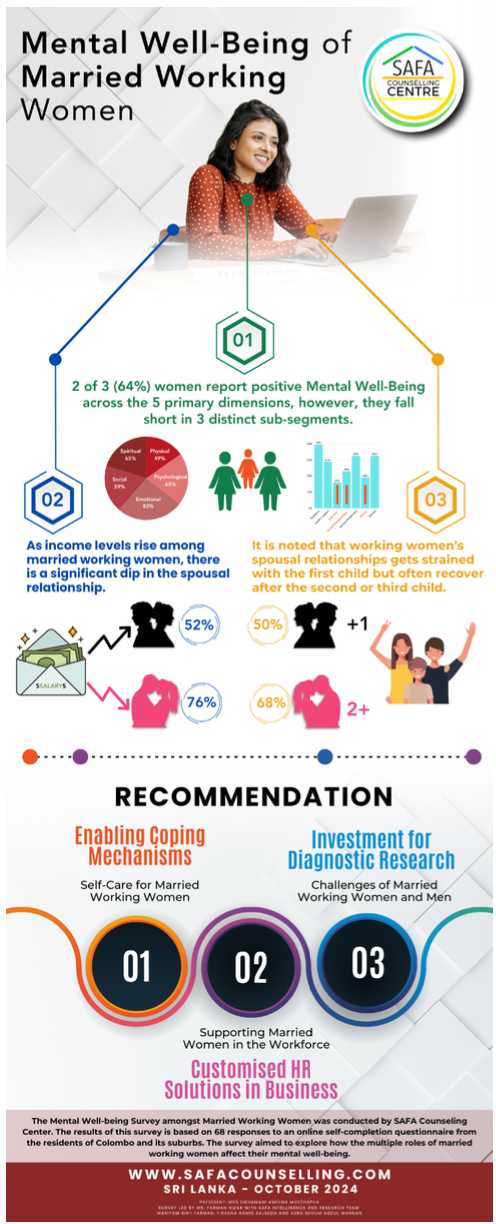The Modern Superwoman: Navigating Work, Home, and Family
Mental Well-Being Survey amongst Married Working Women
In recognition of World Mental Health Day, we at SAFA Counselling Centre conducted a survey around WHO’ s theme of “Mental Health at Work”. Targeted at married working women inColombo and its suburbs, the survey aimed to explore the impact of her multiple roles on her mental well-being. It examines how her commitments, priorities, and the challenges of balancing the significant responsibilities of being a spouse, a career professional and possibly a mother can affect her overall health and wellness.
This on-line survey was conducted between the 3rd to 19th of October 2024.
State of Well-Being captured in the below findings refers to those who claimed to have a positive condition on the diverse well-being areas.
Finding 01 - T otal State of Well-Being of the Married Working Women
Overall, two out of three women (64%) report positive mental well-being across various dimensions; however, they fall short in three distinct sub-segments: social engagement, stress management, and exercise routine.
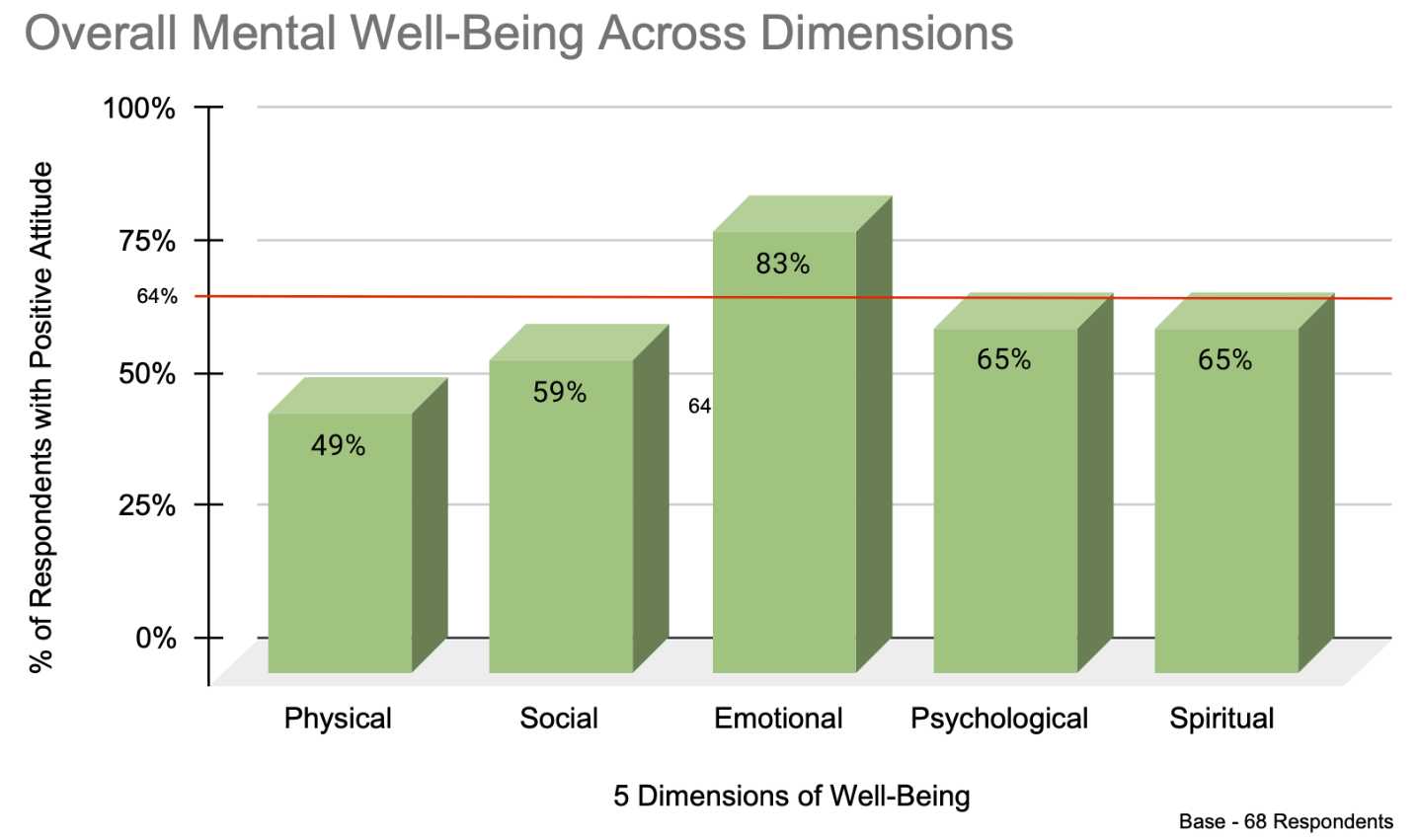
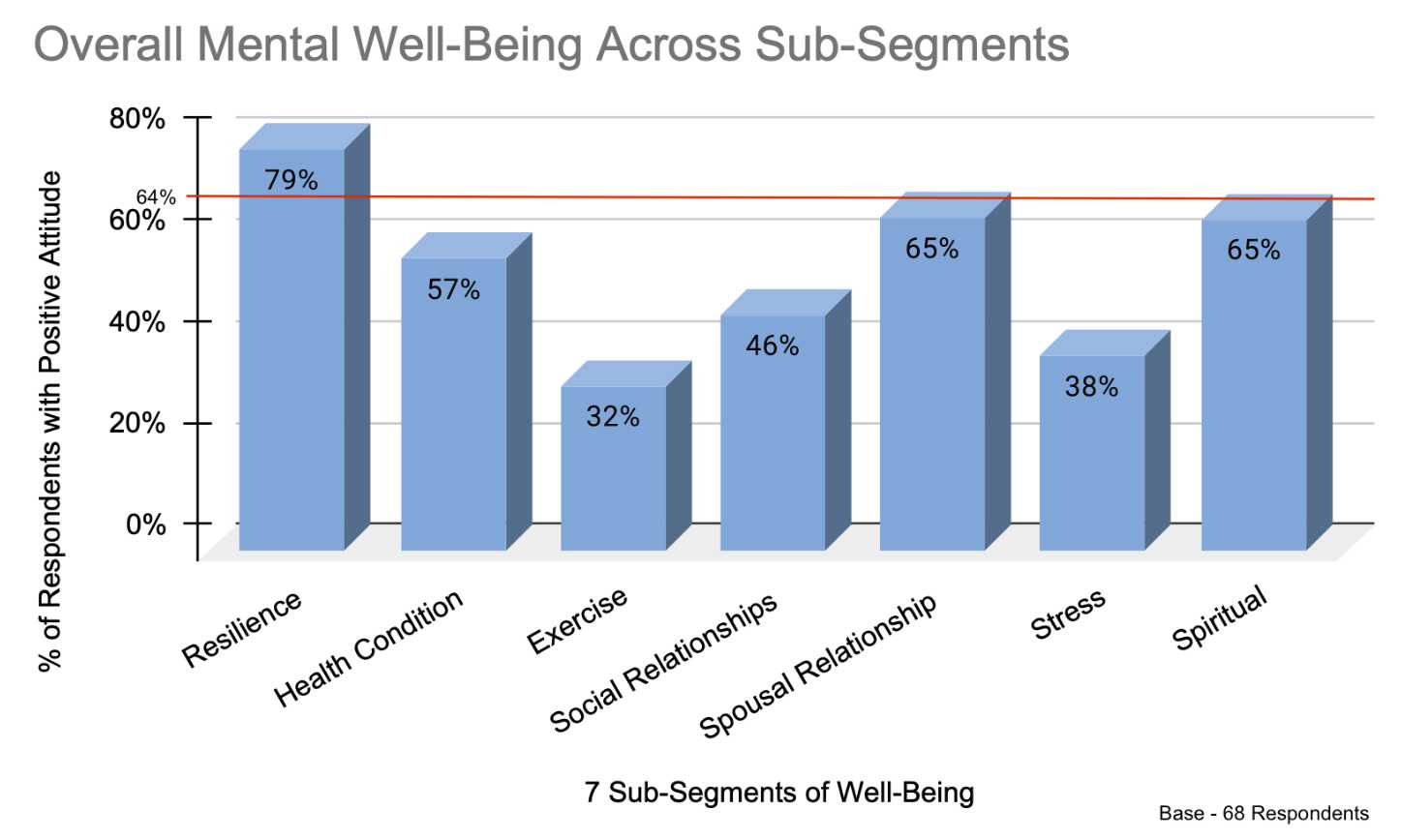
Finding 02 - Impact on Spousal Relationships due to Children
It is noted that the spousal relationship of working women becomes strained with the arrival of the first child; however, there is a nearly complete recovery after the birth of the second or third child.
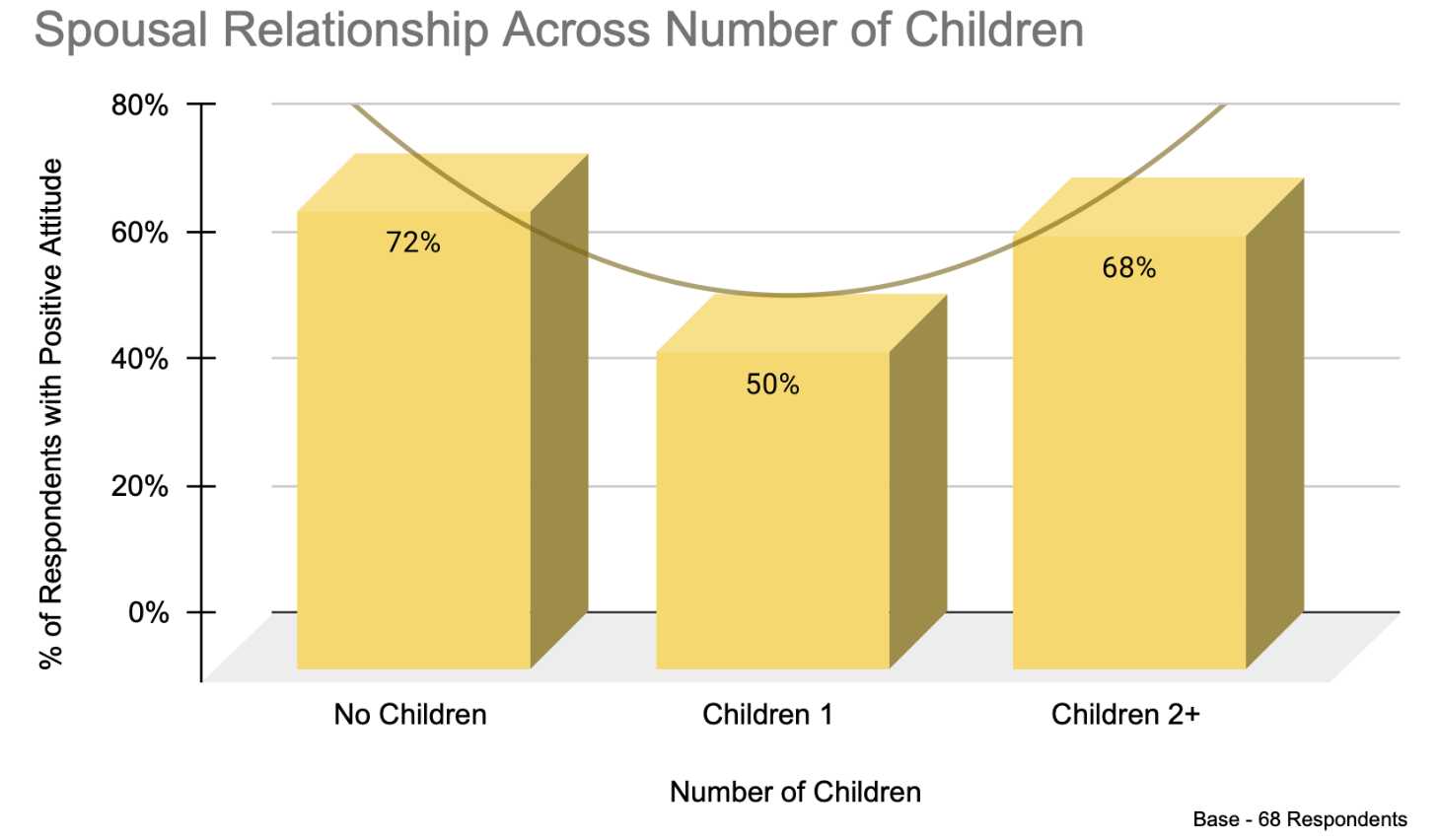
Finding 03 - Impact on Spousal Relationships across the Earning levels of the Working Women
As income levels rise among married working women, there is a significant dip in the spousal relationship; the least affected area is the acknowledgement that both partners fulfil their basic responsibilities to the family. Nevertheless the quality of their personal relationship has undergone great stress among a large community of the higher earning working women
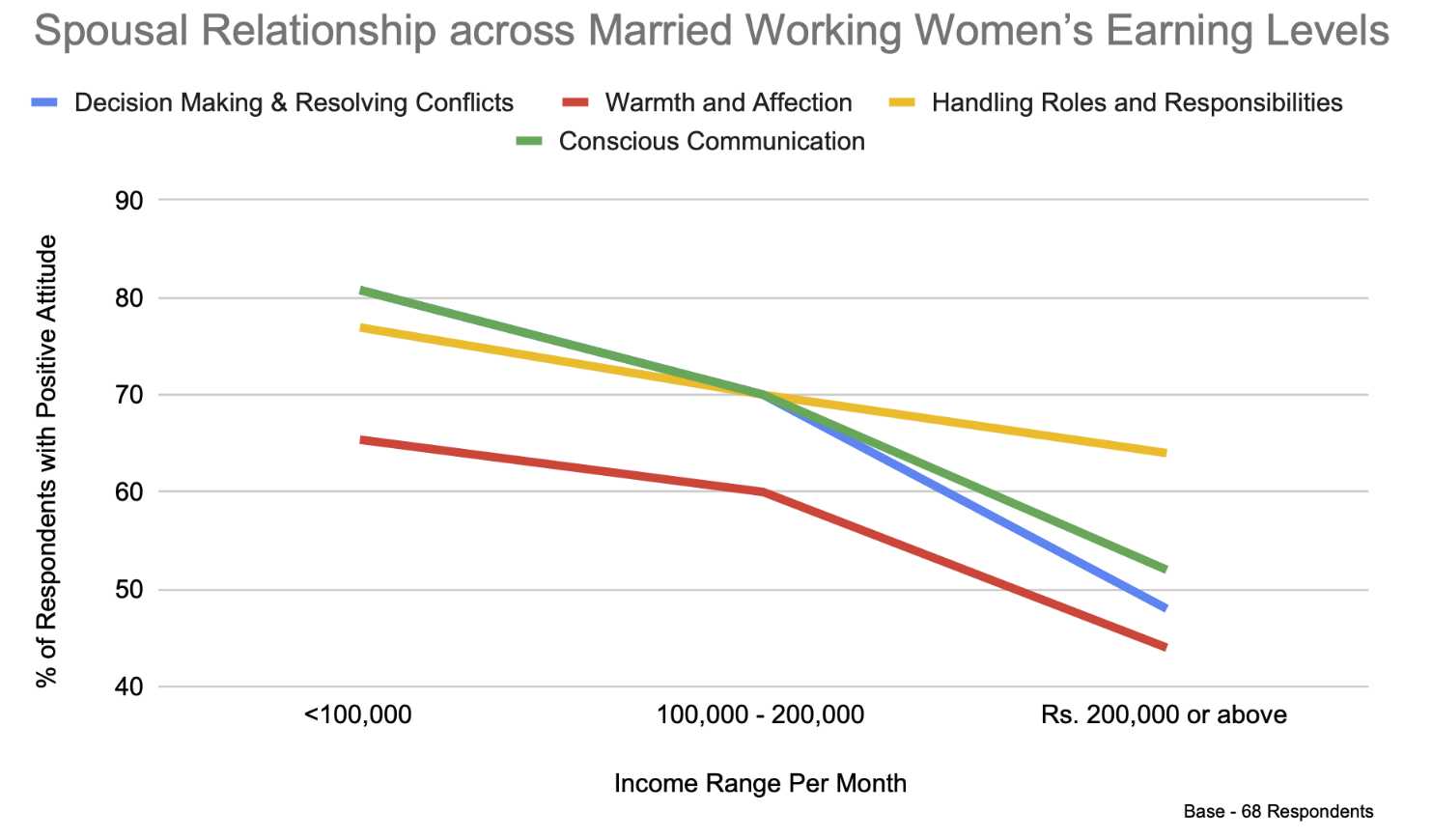
Conclusion
While most married working women have a good state of mental well-being it appears that some areas significantly fall short. These are in the realm of relationships and care. The specific three sub segments are spousal relationship, social engagements and an exercise routine.
Whilst an evolving maturing nuclear family brings back the spousal relationship the higher earning working women’ s challenges don’t seem to go away. Its toll on the spousal connectivity has been significant.
Recommendation
Married working women need to become aware of these challenges and prepare within themselves simple coping mechanisms to avoid worsening of the situation. They could seek help from Occupational Counselors or Productivity Coaches on how to balance their priorities so that time, space and energy can be directed to the other needed areas.
Businesses that employ married women should be sensitive to these challenges they go through.They can consider supporting this community of staff in a different way. Some examples can be:
- Improving productivity culture and reducing late working hours and work on holidays
- Marriage counselling services; both preventive and reactive in order to improve the harmony in the home environment. Inculcating healthy family practices
- Initiatives to bring in an exercise routine in their lives
- Embracing the husbands into specific HR programs to make them feel part of the company and to witness the contribution by their spouse
- Instituting a practice of private family holidays at least once a year
Women’ s organizations, both private and public, need to conduct more detailed research to understand the reasons for the above. It's important to do observational explorations and double blinded experiments to unravel the real problems of this hidden dynamic which is generally removed from the media portrayal of the successful career woman.
The Survey methodology entailed the following:
- It was an online survey conducted through Google Forms
- It was a self-completion questionnaire
- It was shared among known contacts of working women mainly via WhatsApp; some of whom in turn distributed to others in their circle too
- Though 82 people participated for the survey, only 68 were selected since they qualified for the triple criteria of being a woman, who was married and was working
- Most of the questions were worded extremely positively so that the 5-point Likert scale would effectively discriminate the participants' views - a minority of negatively oriented questions were also used to address any pattern bias should it exist
- The primary evaluation metric used was the top two box scores for the 16 positively oriented questions i.e., which indicated agreement to the positive statements. However, for the 6 negatively oriented questions, the bottom two box scores were taken i.e., which indicated disagreement with the negative statements.
-
Analyses were done at a total level and multiple sub-levels
- At a Mental Well-Being Dimension level i.e., Physical, Psychological, Social, Emotional, and Spiritual
- At a Mental Well-Being Sub Segment level i.e., resilience, health condition, exercise, social relationships, spousal relationships, stress, and spiritual condition
- Cross analyses of the above were carried out by demographic cuts, i.e., age, income, married status, children, and residence area.
- If the sample size for any of the sub-breaks was below 15, then the reading of that score was not considered to draw any conclusion.
- Data on their workplace and designation was collected but have not been used to draw any learnings
Interpretive Scope of the Findings:
- The above survey is a current condition assessment only and is not a diagnostic study which evaluates reasons why a particular issue exists.
- The above study does not make a comparative interpretation since it focused on one target group only, i.e., married working women. Hence it is unable to conclude from this study the condition of what other audiences may think, for example, men or unmarried working women or even non-working women.
- The study is based on what respondents claimed and is therefore a reflection of what they think and feel. It is not an assessment of their actual behavior.
- The impact on the above due to other reasons like presence/absence of an extended family, own home, etc. has not been considered.
- The income data refers to the personal earnings of the working woman. It does not include the total monthly household income.
Survey Ownership:
- SAFA Counselling Centre, a project of the Muslim Women's Conference (MWC), run byour president Mrs. Sikhamani Ameena Musthapha and is dedicated to reducing divorce rates in Sri Lanka. We offer marriage workshops and counseling services for couples, both those preparing for marriage and those facing challenges in their relationships, alongside counseling for other areas too. Our team includes experienced male and female counselors, as well as other professionals. In recognition of World Mental Health Day on October 10th, we conducted a survey as part of our ongoing initiatives to promote mental well-being.
- The above survey was conceived, designed, executed, analyzed, interpreted and presented by SAFA Counselling center. This study was led by Mr. Farman Nizar along with SAFA’ s Intelligence and Research T eam - Mariyam Bint Farman, F .Rasna Ramis Sajeedh and Azra Begum Abdul Mannan.
-
For further information on the above or any of SAFA’ s other services please contact
- Hotline - 0720115115
- Email - safacounselling@gmail.com
- Website - safacounselling.com
- Address - 32/1B, S.D.S Jayasinghe Mawatha Kalubowila, Dehiwela, Sri Lanka.
